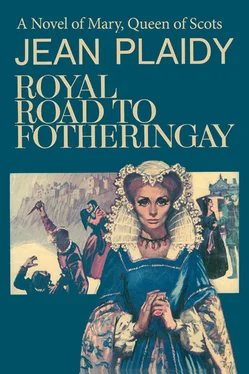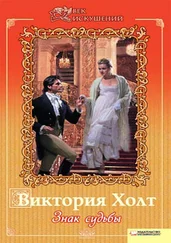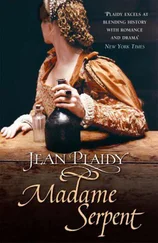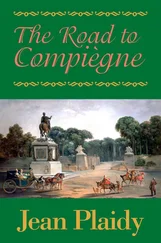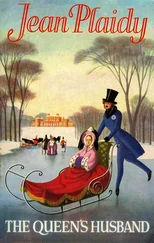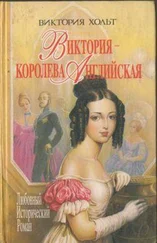He bowed gracefully. “Madame, I will protect your daughter with my life. Messengers shall be dispatched to you; they shall reach you if they have to sink every English ship to do so.”
How vehemently they spoke, thought Mary. How they smiled! How their eyes flashed and how their hands moved with their voices! Strange men! Monsieur de Brézé smelled of violets, or was it roses? His golden beard curled enchantingly. She admired him every bit as much as he admired her.
How happy she could have been if she had not had to part from her mother! But Queen Marie was smiling bravely, although at the last she let affection triumph over ceremony. She held her daughter tightly in her arms, and Mary saw the tears glistening in her eyes.
“The saints preserve you,” were her last words. “Remember all I have taught you. Never forget that you are a queen, my dearest, and all will be well.”
“Good-bye, dearest Maman.”
“I shall see you soon, I feel sure. And now… good-bye.”
The Queen-Mother was escorted off the ship. She stood on the shore gazing after the French fleet, at the fluttering standard bearing the arms of Valois. How small the child looked, wrapped in her heavy cloak, her eyes fixed on the mother she was leaving behind her.
Am I right in letting her go? anxiously wondered Marie de Guise in those moments. What will become of my little one? The King has promised that she shall be as his daughter, but how much can Kings be trusted? What of the Court of France? Is it the right place in which to bring up a child? It was scarcely the most virtuous of courts, but she had heard from her relations that there had been a tightening of morals since the death of François. Was there still that perpetual lovemaking, seeming so decorous and charming—scented notes bearing verses of poetic merit, delicate compliments overlaying orgies and promiscuity like a gossamer veil? Henri was more sérieux than his father had been, and Diane de Poitiers was his faithful mistress, but was Henri’s Court so very different from that of his father?
And Mary—so warm-hearted, so eager to love all, so French in many ways—how would she fare in such a Court? Was it right to pass her over to voluptuous Paris? Was that better than sending her to murderous London? But of course it was! In France were her own family, and they were close to the throne. The house of Guise and Lorraine would look after its own.
Marie de Guise stood erect, fighting back tears while the ships set sail; she watched them until she could see them no more. Then she returned to her apartments in Dumbarton and spent long hours on her knees praying that the royal ship and its escort might escape both perilous storms and the English.
IT WAS a wonderful journey. The wind rose and buffeted the ship, but the five Marys, finding themselves free from restraint, first walked sedately about the deck, then ran, calling to each other, taking off their satin snoods and laughing as the wind caught their hair and flung it back across their faces.
Mary’s half brothers—Lord James who was Prior of St. Andrews, Lord John who was Prior of Coldingham, and Lord Robert who was Prior of Holyrood—stood together watching the children.
“Jamie! Jamie!” called Mary. “Is it not wonderful to be at sea, eh, Robert, eh John?”
The brothers smiled at their little sister, but there was a brooding look in the eyes of Lord James. He could not forget that he, a young man who was strong and healthy, was set aside because he was a bastard. He was merely a rich beneficiary of the Church instead of a king.
The Lords Livingstone and Erskine paced the deck in quiet conversation.
“It will not do to trust them too far,” Livingstone was saying.
“Indeed not,” agreed Erskine.
“Artus de Brézé—ambassador and now the Queen’s governor—what manner of man is he? A jewelled perfumed dummy!”
“The Fleming woman seems to be taken with him and cannot hide it even under the eyes of her son—and she but recently a widow.”
Artus de Brézé was in his turn laughing at the Scotsmen. Such gaunt features, such ruddy skins. Paris would be amused with them. Nor were the women too handsome. The little girls were charming, especially the Reinette. She was someone whom the French would appreciate—a beauty and aware of it already. But the women—with the exception of Lady Fleming—were of small interest. There would be little trouble on their account.
He wondered whether he could seduce the red-haired lady during the voyage. It would be rather piquant. At night with the darkness all about them, on the high seas, in danger of an English enemy sighting them at any moment. A Scot and a king’s daughter at that! Very amusing! thought the Sieur de Brézé.
Now the little one was standing beside him.
“Monsieur!”
It was a pleasure to hear her speak; it was a delight to look into the upturned face at those long eyes thickly lashed, that soft mouth which was meant for tenderness. He could not help but picture her, say, in ten years’ time.
“I am at Your Majesty’s service. You must not cease to call on me at any hour of the day and night. It will be my pleasure to see that your smallest wish is granted.”
She laughed, showing her pretty teeth. “Ah, Monsieur de Brézé, you say such nice things.”
“I say only that which the beauty of Your Majesty impels and inspires me to say.”
“Monsieur de Brézé, if you would lift me up I could sit on the rail, and that is what I wish to do.”
She was light, and she laughed as he lifted her.
“Why do you regard me in that way, Monsieur?”
“Your Majesty is an enchantress. I see it already.”
“What is an enchantress?”
“It is what you are and what you will increasingly become.”
“Is it a good thing for a queen to be?”
“It is a good thing for anyone to be—man or woman, queen or commoner. Tell me, what do you think of us Frenchmen?”
“I love you all. And do you think the King of France will love me?”
“He could not fail to do so.”
“And the Queen?”
“The Queen also. The King has said: ‘The little Queen shall be as my daughter.’ He says that before he has seen you; but when his eyes fall on you, my little Queen, he will say much more. Where is your governess?”
“The sea has made her ill and she will not show herself.”
“You must tell her that I am desolate.”
“Desolate, Monsieur? But you look so happy.”
“I am desolate to know that she suffers. Will you tell her that?”
“Yes. Put me down and I will tell her at once.”
When she was on her feet she retreated a pace or two. She said with a smile: “I shall tell her that you say you are desolate, and look so happy when you say it.”
She started to walk away.
“Your Majesty,” he called. “I will explain.”
She stopped, turned and regarded him gravely. Then she said demurely: “My mother and my guardians have told me that we must quickly learn the ways of the French … all of us.”
He watched her skipping away. So beautiful! So young! And already with some knowledge of the ways of the world.
THE FRENCH GALLEYS were in sight of land, and the dangerous journey was nearly over. Mary stood with Lady Fleming, her three brothers and the four Marys, watching the land as they approached it. None of them was more relieved than Lady Fleming that the journey was over. She declared she had come near to dying. So ill had she been that she had implored Monsieur de Villegaignon to let her go ashore when they were within a few miles of the coast of England; she had felt then that she would rather die at the hands of the English than become a victim of the sea. Monsieur de Villegaignon had forgotten his French manners and peremptorily told her that she should not land; she should go to France or drown by the way. What a mercy it had been that they had brought Scottish navigators with them. These men, accustomed to stormy weather and rocky coasts, had been invaluable during the voyage.
Читать дальше
